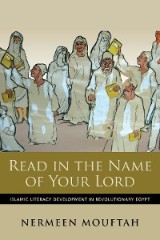Details

Read in the Name of Your Lord
Islamic Literacy Development in Revolutionary EgyptPublic Cultures of the Middle East and North Africa
|
CHF 28.00 |
|
| Verlag: | Indiana University Press |
| Format: | EPUB |
| Veröffentl.: | 05.11.2024 |
| ISBN/EAN: | 9780253071064 |
| Sprache: | englisch |
| Anzahl Seiten: | 244 |
DRM-geschütztes eBook, Sie benötigen z.B. Adobe Digital Editions und eine Adobe ID zum Lesen.
Beschreibungen
<p>Egypt's January 2011 uprising spurred millions to action with a cacophony of demands—including the call to address Egypt's education crisis and adult literacy rates. </p>
<p><i>Read in the Name of Your Lord</i> traces the push for universal literacy as a project caught between revolutionary activism and Islamic reformism in post-Mubarak Egypt. Despite their many disagreements, religious reformers, revolutionaries, and state actors converged on literacy as the first step toward realizing aspirations of the revolution. They invoked the verse Muslims believe was the first to be revealed, "Read in the name of your Lord," to teach literacy as a religious duty and the foundation for the country's future. Nermeen Mouftah unravels how this religiously inspired push for universal literacy was born of twenty-first-century scripturalism and simultaneously went beyond the Quran, to make reading and writing virtuous acts of the liberal state. While revolutionary literacy campaigns soon vanished and adult literacy rates remained stubbornly low, their efforts revealed the importance of recognizing alternative modes of text processing and the personhood and knowledge of nonliterate people. </p>
<p><i>Read in the Name of Your Lord</i> demonstrates how the rise in modern scripturalism underpinned literacy activism, blurring the binary between secular and religious knowledge.</p>
<p><i>Read in the Name of Your Lord</i> traces the push for universal literacy as a project caught between revolutionary activism and Islamic reformism in post-Mubarak Egypt. Despite their many disagreements, religious reformers, revolutionaries, and state actors converged on literacy as the first step toward realizing aspirations of the revolution. They invoked the verse Muslims believe was the first to be revealed, "Read in the name of your Lord," to teach literacy as a religious duty and the foundation for the country's future. Nermeen Mouftah unravels how this religiously inspired push for universal literacy was born of twenty-first-century scripturalism and simultaneously went beyond the Quran, to make reading and writing virtuous acts of the liberal state. While revolutionary literacy campaigns soon vanished and adult literacy rates remained stubbornly low, their efforts revealed the importance of recognizing alternative modes of text processing and the personhood and knowledge of nonliterate people. </p>
<p><i>Read in the Name of Your Lord</i> demonstrates how the rise in modern scripturalism underpinned literacy activism, blurring the binary between secular and religious knowledge.</p>
<p>Acknowledgments<br>Note on Transliteration and Translation<br>Acronyms<br>Prologue: Girl in a School Uniform<br><b>Part I: Faith in Reading<br></b>Introduction: God's First Command<br>1. Religious Reading in an Unlettered Nation<br><b>Part II: The Word of God for All<br></b>2. The Quran and Bible as Method<br>3. Scripturalism among Nonliterate Women<br><b>Part III: The Virtues of Basic Literacy<br></b>4. Making Mothers Read<br>5. Workers Writing Toward Dignity<br>Postscript<br>Bibliography<br>Index</p>
<p>Nermeen Mouftah is Assistant Professor of Anthropology at the University of Illinois Chicago.</p>
<p>Mouftah's careful ethnographic examination of adult literacy programs in Egypt acts as an intersection from which the reader can turn one way or another to explore everything from debates about Qur'anic hermeneutics and contemporary theories of development, to gender and language ideologies, the false promises of neoliberalism, and the cruel optimism of revolutionary hope.</p>


















